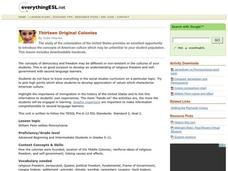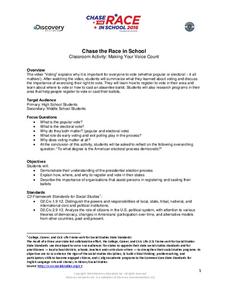Alabama Department of Archives and History
Alabama's 1901 Constitution
"We, the People of the State of Alabama. . ." Did you know that the Alabama State Constitution has 357,157 words while the US Constitution has only 4,400? And that it has 798 amendments while the US Constitution has 27? Class groups...
Curated OER
Role of the Government
Namely through discussion, get your opinionated scholars examining the roles of government- is it even necessary? They analyze the quote: "To be free, one must be chained," writing what it represents and then sharing. Consider...
Curated OER
McMUN Model United Nations
If you have been searching for a plan to run a model U.N. simulation, this plan provides some bare bones for your instructional activity. Scholars break into blocs to research and discuss global issues and come up with collaborative...
Curated OER
Thirteen Original Colonies
An outstanding instructional activity on the Thirteen Original Colonies, and the settling of Pennsylvania by William Penn is here for your learners. Valuable discussion takes place regarding how the colonies were settled, and some...
Curated OER
The Statue of Liberty: The Meaning and Use of a National Symbol
Engage your class in a series of activities, each related to the use or analysis of symbols used to convey patriotic or national concepts. They identify different national symbols and explain their meanings, discussing the importance of...
Center for Civic Education
The Equal Rights Amendment in the 1970s and Today
Discover the fascinating history of the Equal Rights Amendment and discuss the major implications and considerations associated with it today. Here you will find background information on the topic, a graphic organizer summarizing...
Curated OER
Patriotic Symbols of the United States
Young historians take a close look at the most famous patriotic symbols of the United States and determine what they actually stand for. Symbols such as Uncle Sam, The Statue of Liberty, The Bald Eagle, and The Liberty Bell are studied....
George Washington's Mount Vernon Estate & Gardens
George Washington: Centerpiece of a Nation
A neat Presidents Day activity, this lesson plan provides a culminating learning experience for upper elementary aged learners. After analyzing George Washington's, "A Display of the United States of America," your learners will conduct...
Facing History and Ourselves
The Audacity of a Vote: Susan B. Anthony’s Arrest
Susan B. Anthony's speech "Is It a Crime for Women to Vote?" takes center stage in a lesson that asks class members to consider how they might respond to what they consider an unjust law. Groups work through the speech paragraph by...
National Endowment for the Humanities
Ratifying the Constitution
Ratifying the Constitution was no simple task. Using primary sources, such as classic writings from the Federalists and Anti-Federalists, young scholars examine the arguments for and against the Constitution. They then decide: Would they...
Discovery Education
Making Your Voice Count
As learners watch a video on voting, they take notes on a worksheet that lists various voting topics, including electoral and popular votes, early voting, and exit polling. Then, young people research the Internet for their state's...
Alabama Department of Archives and History
Alabama's Steps to Statehood
To demonstrate their understanding of the steps Alabama took to become a state, groups create a poster that identifies what the United States Constitution and the Northwest Ordinance required of a territory to become a state.
Japan Society
Akutagawa Ryunosuke and the Taisho Modernists
Japan's Taisho Period was a time when authors like Akutagawa and other Japanese modernists began to experiment with point of view and literary form, making the literature produced during this time period a natural choice for teaching...
Classroom Law Project
What does the Constitution say about voting? Constitutional Amendments and the Electoral College
As part of a study of voting rights in the US, class members examine Constitutional amendments connected with voting and the role of the Electoral College in the election process.
Museum of Tolerance
And Justice for All? Slavery Not Just in the Past
Slavery in India, Sudan, and Mauritania? What about in the United States? Groups research modern slavery in these four countries, collecting factual evidence (What), determine their feelings about this evidence (So what), and consider...
Deliberating in a Democracy
Preventive War
"Those who knocked these buildings down will hear from all of us soon!" - George W. Bush. Scholars investigate and analyze the events of September 11, 2001 in ushering in the Bush Doctrine on foreign policy. Using primary documents as...
Ohio Center For Law-Related Education
Four Activities: Thurgood Marshall and the Nomination and Confirmation of Federal Judges
The process of nominating and confirming federal judges can sound like a lot of bureaucratic hoops, but a resource breaks down the steps of the Supreme Court nominations in a simpler manner. Learners participate in four activities that...
School Improvement in Maryland
United States Foreign Policy
Policies of United States government which promote or fail to promote relationships with other countries—national defense, arms control, security of other nations, trade, human rights, economic sanctions, foreign aid, etc.—come under...
Curated OER
CDV, CDV, What's a CDV?
Introduce your class to the Core Democratic Values. The lesson focuses on defining the Core Democratic Values and related terms. Small groups look up terms and present a song based on the information they've found. After the...
Other popular searches
- Roots of American Democracy
- Basis of American Democracy
- Origins American Democracy
- Early American Democracy
- Native American Democracy
- Analyze American Democracy




















